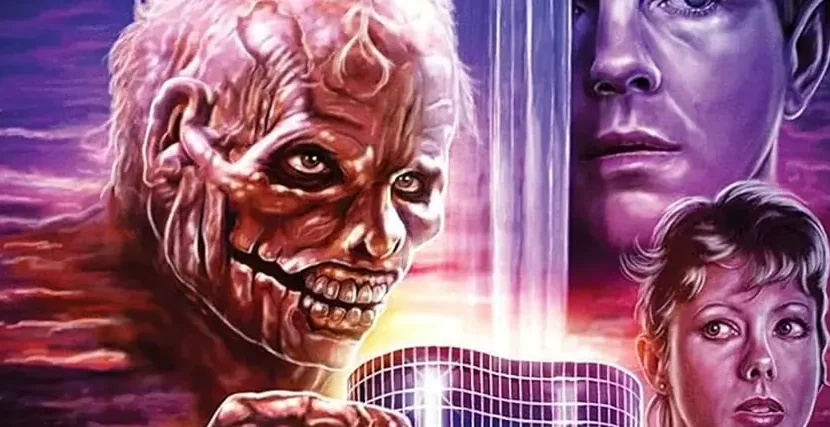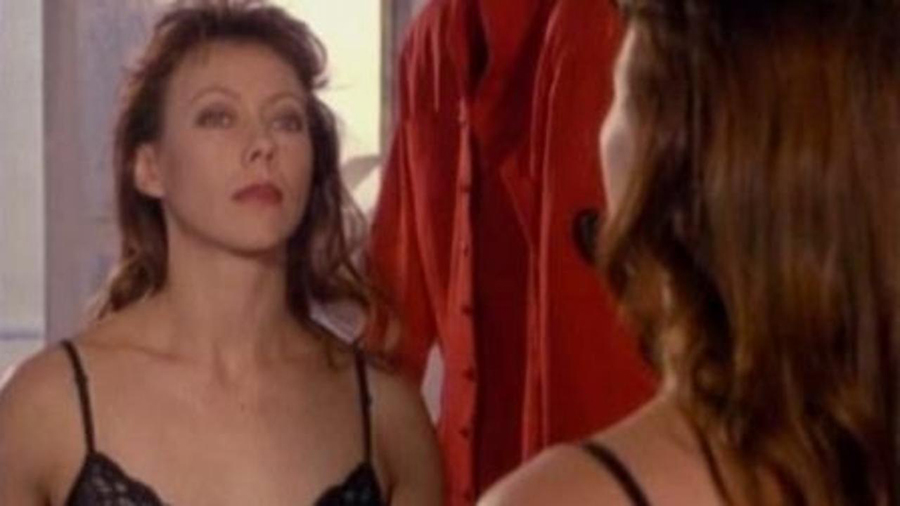DARK TOWER. Not the One by Stephen King

Freddie Francis – the cinematographer behind David Lynch’s productions (The Elephant Man, Dune, The Straight Story), Martin Scorsese’s Cape Fear, and many other films, as well as an Oscar winner for his work on Edward Zwick’s Glory – in addition to his masterful cinematography for acclaimed directors, also dabbled in directing. His portfolio includes works like the excellent thriller Paranoiac and several other films, mostly horror. His most productive period was during the 1960s and 1970s, when he often collaborated with horror icon Peter Cushing. This time, Francis created another entry in his beloved genre – Dark Tower, a film from the 1980s about a haunted and thoroughly modern building. What does a veteran director do when faced with such a theme? Does he call the Ghostbusters, an exorcist, or perhaps John McClane?
Carolyn Page, an ambitious and attractive architect, works in a skyscraper she designed. A series of seemingly absurd deaths in the building disrupts her peace. Dennis Randall, a security inspector, begins to investigate the situation. He finds himself increasingly influenced by the strange forces at play and drawn to Carolyn. It soon becomes clear that the situation involves supernatural elements.
Dark Tower is a largely forgotten title. It is a curiosity. It blends old-school elements with modern ones, combining interesting ideas with outright missteps. The story revolves around a haunted location (a familiar motif in cinema, seen in films like The Legend of Hell House or The Amityville Horror). However, in Francis’s film, the exploration takes place not in dark, shadowy corridors or basements but in brightly lit modern offices, elevators, or technical rooms filled with humming electrical equipment. The setting resembles Die Hard‘s Nakatomi Plaza, albeit brighter and initially more welcoming. Still, like McTiernan’s building, parts of this skyscraper remain under construction, and the filmmakers lead us through its raw and unfinished sections.
At first glance, the setting feels like a place where technical malfunctions might occur rather than paranormal intrusions. However, Francis effectively establishes an otherworldly atmosphere right from the opening scenes. The tension builds despite the abundance of daylight and artificial lighting within the bright walls of the building. The slow pace creates a dreamy aura, enhanced by the Spanish cityscape, which the director imbues with a mystical quality. This distinctly un-American setting is both intriguing and refreshing. The surreal mood persists throughout, even in scenes set indoors. Francis masterfully captures a European atmosphere using simple means – unsettling music and skillful cinematography that maximizes the eerie potential of cityscapes and the building’s interiors.
The film’s modest budget is evident; it lacks any extravagance. During slower moments, it can feel like a low-budget TV production designed to pass 90 minutes without much thought. Yet, Francis manages to draw us into the simple story despite its lack of originality or dazzling execution. Dark Tower feels outdated, even for its time, with a peculiar blend of modernity, naïveté, and leisurely pacing.

Nevertheless, the film has a magnetic quality. As the investigation into the mysterious deaths unfolds, one feels a lurking presence – a sensation reminiscent of reading H.P. Lovecraft’s prose. The first half, where the security inspector gropes in the dark for answers while gravitating toward the alluring architect, is the most engaging. Unfortunately, the tension drops when the inspector assembles a ghost-hunting team, including a verbose elderly parapsychologist. The final reveal is banal and overly literal, with accompanying scenes descending into pure kitsch, clashing with the atmosphere built earlier. Additionally, the budding romance between the two protagonists, which added tension to the film’s early sections, is abandoned, leaving a sense of missed opportunity. Still, the filmmakers succeed in maintaining enough intrigue to keep viewers watching until the credits roll.
The film echoes the work of Hammer Productions or Roger Corman’s Poe-inspired adaptations, albeit slightly modernized (mostly in terms of technical details, not narrative or aesthetic elements). Those expecting fast-paced action akin to a Michael Dudikoff film will be disappointed. Nor will there be humor – the film takes its horror seriously, though its impact wanes midway and is ultimately undermined by grotesque moments in the latter half. Blood and gore are minimal; instead, viewers are unsettled by screws unscrewing themselves and wild energy surges wreaking havoc in offices. Dark Tower is decidedly soft horror.
The film features no A-list actors. Michael Moriarty is a familiar face, though most viewers may struggle to recall where they’ve seen him. With his boyish middle-aged appearance, he’s an unconventional tough-guy detective. His performance can take some getting used to – he speaks loudly and seems to read from a cue card above the camera, while moments of tension make him appear as though he’s about to suck on a pacifier. Yet somehow, his quirky portrayal fits the film. Jenny Agutter, his co-star, looks and acts like she stepped off the set of Dynasty – and she too oddly fits.
Freddie Francis once impressed me with Paranoiac, but Dark Tower left me with a sense of dissatisfaction and perhaps even frustration. It wasn’t a bad experience, but the cover art I remember from my childhood – the one released by Vim – promised something more.

